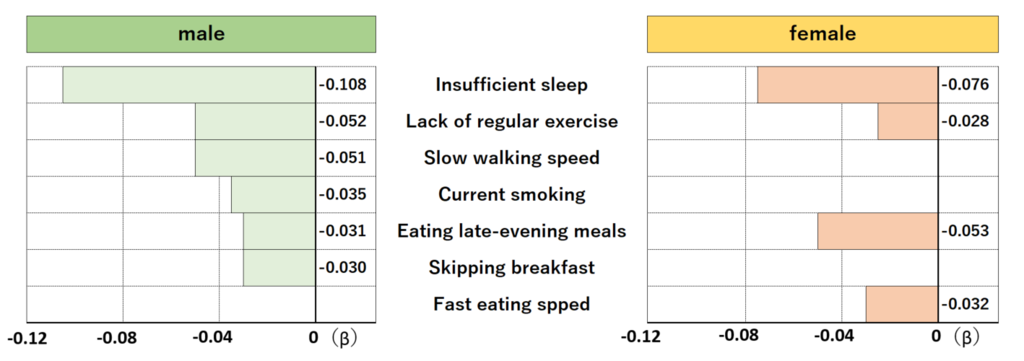・This study showed that insufficient sleep, lack of regular exercise, and eating late-evening meals were related to presenteeism, with insufficient sleep being the most critical factor.
・Next, slow walking speed, smoking, and skipping breakfast were related to presenteeism in men, while fast eating speed was related to presenteeism in women.
・Thus, more lifestyle habits were related to presenteeism in men than in women. Efforts should focus on improving sleep problems in both men and women and other lifestyle habits associated with presenteeism in each sex.
Abstract
This study aimed to identify lifestyle habits related to presenteeism among Japanese company employees by sex. A cross-sectional study was conducted using data of lifestyle habits from self-administered questionnaires during specific health checkups, of presenteeism assessed using the World Health Organization Health and Work Performance Questionnaire (HPQ) short form, and of health insurance claims for 12,476 employees of a Japanese company in 2016. Multiple regression analysis was conducted for each sex, with HPQ score as the objective variable, lifestyle habits as the explanatory variables, and age, job position, department, and medical treatment as adjustment variables. Both sexes demonstrated associations between presenteeism and lifestyle habits, such as insufficient sleep, lack of regular exercise, and eating late-evening meals. Insufficient sleep exhibited the strongest relationship. Furthermore, presenteeism was associated with additional factors specific to each sex, including slow walking speed, current smoking, skipping breakfast in men, and fast eating speed in women. Insufficient sleep, lack of regular exercise, and eating late-evening meals critical for presenteeism among Japanese employees of both sexes. However, other lifestyle habits related to presenteeism differed between men and women. Men tended to exhibit more lifestyle habits related to presenteeism compared to women.
Benefit
This is the first study to examine the gender-based relationship between presenteeism and comprehensive lifestyle habits such as smoking, exercise, diet, drinking, and sleep among Japanese corporate employees. These findings suggest that regardless of sex, getting enough rest through sleep, exercise habits, and eating dinner at an appropriate time is particularly important for improving work performance. Additionally improving overall lifestyle habits such as exercise, diet, sleep, and smoking is essential for enhancing work performance among men. Moreover, it is necessary to examine support measures for working women’s diets in improving employee presenteeism in Japan.
Market Application
Development of employee wellness programs and health management systems, development of insurance products by life insurance companies and policymaking for health promotion at government-affiliated think tanks
Publications
https://link.springer.com/article/10.1007/s10389-023-02136-4

